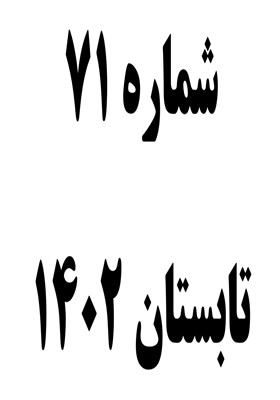The position of Khwaja Ahmad Yessavi in Sufism and Islamic mysticism
Subject Areas : Epistemological and methodological researcher of historical research
1 - Persian literature language of Farhangian University, Bojnoord, Iran
Keywords: Central Asia, Islamic Mysticism, Khwaja Ahmed Yesavi, Vararoud,
Abstract :
Central Asia is one of the main centers of Sufism and Islamic mysticism. From the second century of Hijri to the eighth century of Hijri, teachings and tariqats such as "Hakimiya" attributed to Hakim al-Tirmidhi, "Kabaruyeh" attributed to Sheikh Najmuddin Kabra, "Khwajgan" attributed to Khwaja Abdul Khaliq Ghajdwani, "Yessowiyya" attributed to Khwaja Ahmad Yasavi and "Naqshbandiyya" attributed to Khwaja Bahauddin nurtured Naqshbandiyya in his bosom and thereby contributed greatly to the growth and expansion of Islamic thought in the East of Islam.Khwaja Ahmad Yesavi is considered one of the prominent figures of Sufism and mysticism in the history of mystical teachings of Central Asia. He has a special position in the eyes of the lord of knowledge. Khwaja Ahmad founded a special school called "Yesuyeh" and this school was later welcomed in the entire region of Central Asia, from Turkestan to Trans-Nahr, from the Aq Idel Sea to Eastern Turkestan, Khorasan, Iran, and the Caucasus even to It spread to Rome.
_||_

